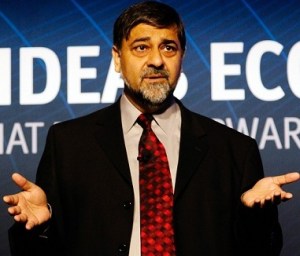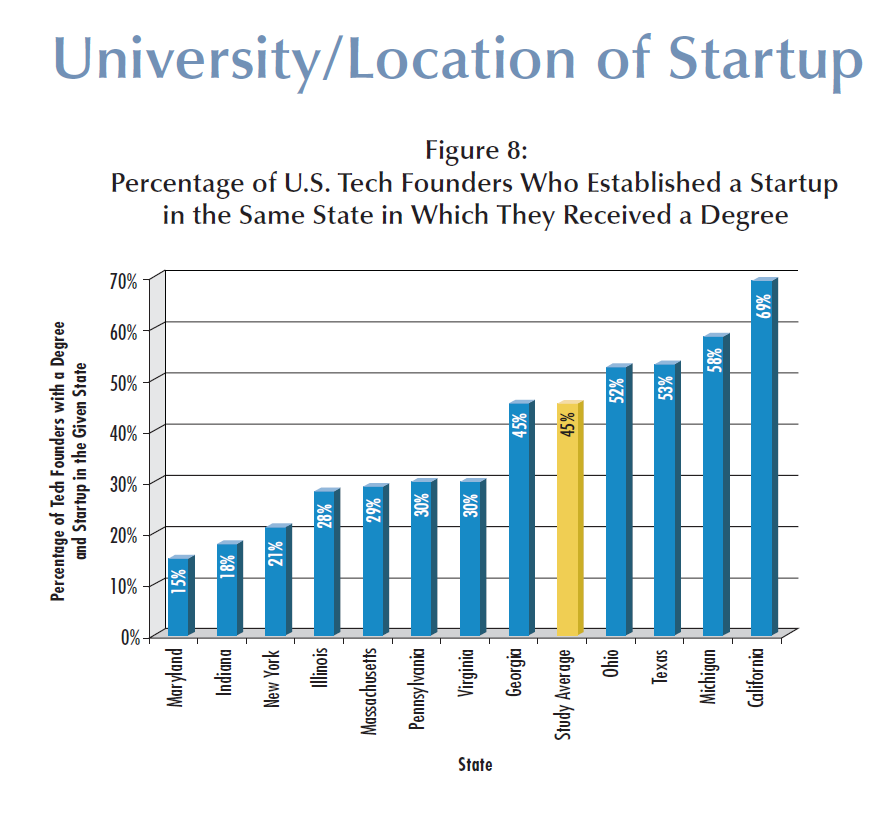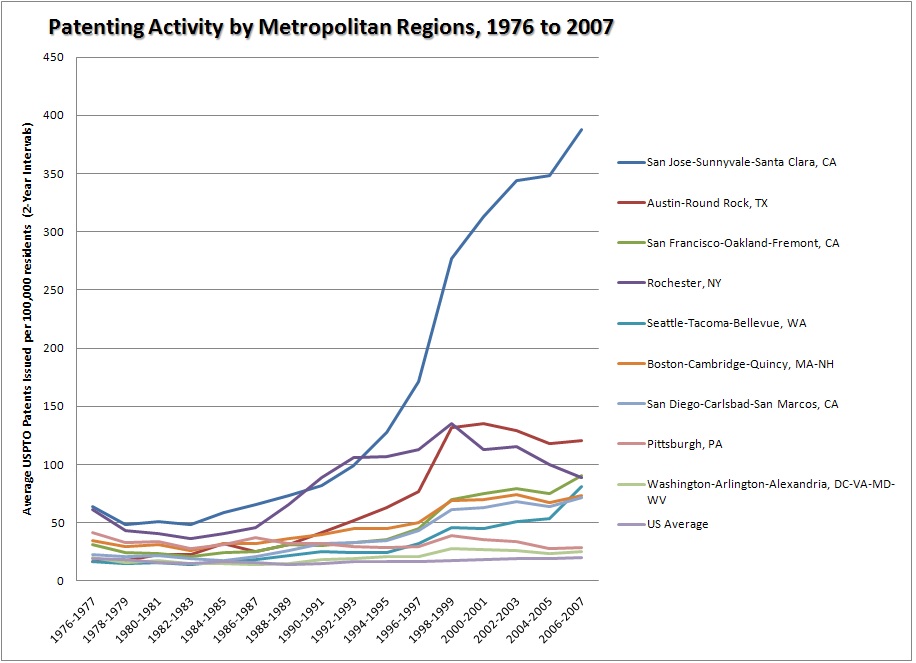 As TechCrunch readers know by now, I speak my mind and don’t shy away from controversy. I am even more provocative when I talk to students. My goal is to make them think outside the box. I encourage students not only to challenge authority, but also to challenge me. I tell them that with my research on globalization, entrepreneurship, and U.S. competitiveness, I am learning as I go; no one has all the answers; I could be wrong. In some talks, I present the available data; in others I just discuss what I have learned.
As TechCrunch readers know by now, I speak my mind and don’t shy away from controversy. I am even more provocative when I talk to students. My goal is to make them think outside the box. I encourage students not only to challenge authority, but also to challenge me. I tell them that with my research on globalization, entrepreneurship, and U.S. competitiveness, I am learning as I go; no one has all the answers; I could be wrong. In some talks, I present the available data; in others I just discuss what I have learned.
Over the last ten days, I have lectured at four universities: Columbia, Emory, MIT, and UC-Berkeley. The discussions were all lively, and I received very positive feedback from students.
But my talk at MIT, last Monday, seems to have set off a firestorm.
When MIT Entrepreneurship Club co-president Slava Menn invited me to speak at the Sloan School of Management, he said that students would be very interested in learning about the differences between Silicon Valley and Boston and why Silicon Valley is so far ahead of Boston in tech entrepreneurship. I suggested we make this more constructive, and focus on how Boston’s entrepreneurs can help it catch up. Since this was a lunchtime talk and not a for-credit class, I thought I would make it a Q&A-type session—without boring PowerPoint slides. And I assumed that, just as everyone knows that Boston’s weather doesn’t compare favorably to Palo Alto’s, everyone also knows that Boston lost the race to Silicon Valley—20 years ago.
I started with an informal discussion of my background—a tech entrepreneur who became an academic and researcher. I discussed the myths my research has been shattering, and how surprised I am that, with the data we have gathered, I can challenge governments on their innovation strategies. I said I had spent 18 months in Silicon Valley researching the success of its immigrant groups (they start 52% of its tech companies). I explained that there are valuable lessons that can be learned from these successes and that these lessons can be applied to fixing some of the Valley’s problems—such as its dearth of women and minorities.
I also discussed my experiences in Silicon Valley and what it is that, in my opinion, makes the Valley what it is.
In Silicon Valley, sharing information is the norm—unlike most places in the world, including Boston. In the Valley, techies are far less secretive and are generally helpful to one another. Silicon Valley cherishes failure—because people understand that building a technology company requires experimentation; that it takes trial and error to perfect a technology and business model; and that you learn from failure. Many entrepreneurs who achieve success, such as Jeff Clavier and Mike Maples, stay in or move to Silicon Valley and become angel investors and mentors. Students stay in the area after they graduate, and they move here from all over the U.S. Silicon Valley is one giant network with dozens of networking events happening every week.
I also said that the most important characteristic of Silicon Valley is its ability to reinvent itself: it readily accepts new ideas and tries new things. Yes, it sometimes drinks its own Kool-Aid and obsesses with the latest fad, but it also discards dated concepts and ideas very fast. I gave the example of the business plan, which, as any entrepreneur will tell you, is the greatest piece of fiction that a startup creates. Whilst the market research and planning that go into creating them are very valuable, the financial projections and five-year plans never bear resemblance to reality. Silicon Valley’s thought leaders, such as Steve Blank and Eric Ries, are now advocating the concept of the lean startup—which takes small steps and iterates.
MIT is known for its $100K business-plan competition. I said that it was time to rethink it. I discussed a TechCrunch post in which I’d said that very few contest winners made it big. Even the company that MIT boasts about—Akamai—lost the contest; and the products and business model that Akamai eventually developed bore no resemblance to what it had entered in the contest. And I said that I didn’t know of any other big successes that have resulted from MIT business plan contest. (The students corrected me on this and said one company, SmartCells, was recently acquired for $500m. And there were a few others from the ‘90s—the good old dot com days.)
I really enjoyed the session. And many students told me that they’d learned a lot from it. So I was very surprised to see the spate of criticism that followed.
In the audience was Scott Kirsner, a columnist for the Boston Globe—who had been very upset at an article that I’d written, last year, about how Silicon Valley had left Rt. 128 (Boston) in the dust. I noted his smirks, grins, and distraction during the class. But he didn’t challenge my assertion that Silicon Valley was ahead of Boston—despite his Tweets demanding data. And then Kirsner descended into the mud with a series of unprofessional, nasty, personal attacks against me on Twitter. He dug up some old material on battles that I’d fought—and won— during my recovery from a heart attack in 2002.
In every community you have immature, opinionated loudmouths. These are usually outliers whom people tolerate but ignore. That is what I thought Kirsner was—until dozens of other Bostonians, including some tech CEOs, chimed in with him and demanded data. Then the MIT Entrepreneurship Center posted a disrespectful blog on its website: Why the MIT Ecosystem and the $100K are important (or why @vwadhwa has no clue what he is talking about). (This missed the point—I hadn’t said that MIT hasn’t made a major impact. Of course it has; it is one of the greatest universities in the world.) And then the Boston Globe published this silly piece by Kirsner (I say “silly” because it distorts the conversation).
To be fair, a number of Bostonians have written to me to apologize and say that this group does not represent the larger community. One of Boston’s most respected VCs, Fred Destin, wrote a post discussing The ridiculous Vivek Wadhwa furore and the new Boston Tea Party. Even European tech journalist Milo Yiannopoulos came to my defense (‘Over the hill’ Boston tech community lashes out at academic).
Still, many people have demanded that I present data that validate my views. Instead of cluttering up TechCrunch with these data—which will seem obvious to most people—I have included some highlights below and posted far more on my personal website. In my talk, I had also commented that Boston is at a disadvantage because its “weather sucks”. Here are some data that prove this. And here is an academic paper by University of Michigan Prof. David Albouy which shows that the quality of life is far better in Silicon Valley than in Boston.
The two people whom I have learnt the most from about regional competitiveness are the UC-Berkeley School of Information’s dean, AnnaLee Saxenian (who is my sponsor at Berkeley and a coauthor on several papers), and Director of the Martin Prosperity Institute at University of Toronto, Prof. Richard Florida. They have both published books that explain why Silicon Valley triumphed over Boston and what it takes to build a successful tech center. I have included summaries below. I suggest that all Bostonians read these. They explain the issues far better than I can. And they contain lots of data.
Why is it that business in California’s Silicon Valley flourished while along Route 128 in Massachusetts declined in the 90s? The answer, Saxenian suggests, has to do with the fact that despite similar histories and technologies, Silicon Valley developed a decentralized but cooperative industrial system while Route 128 came to be dominated by independent, self-sufficient corporations. The result of more than one hundred interviews, this compelling analysis highlights the importance of local sources of competitive advantage in a volatile world economy.
Florida, an academic whose field is regional economic development, explains the rise of a new social class that he labels the creative class. Members include scientists, engineers, architects, educators, writers,
artists, and entertainers. He defines this class as those whose economic function is to create new ideas, new technology, and new creative content. In general this group shares common characteristics, such as creativity, individuality, diversity, and merit. The author estimates that this group has 38 million members, constitutes more than 30 percent of the U.S. workforce, and profoundly influences work and lifestyle issues. The purpose of this book is to examine how and why we value creativity more highly than ever and cultivate it more intensely. He concludes that it is time for the creative class to grow up–boomers and Xers, liberals and conservatives, urbanites and suburbanites–and evolve from an amorphous group of self-directed while high-achieving individuals into a responsible, more cohesive group interested in the common good.
Here are some of the data that you can find on my personal website
| The Silicon Valley Advantage – Some Benchmarks | Pop 2006 |
| Silicon Valley has more people
San Jose-Sunnyvale-Santa Clara, CA |
4,391,344 |
| Boston-Cambridge-Quincy, MA-NH Metro Area | 1,735,819 |
| GDP per Capita | |
| It has substantially more economic output per head
San Jose-Sunnyvale-Santa Clara, CA |
$86,069.13 |
| Boston-Cambridge-Quincy, MA-NH Metro Area | $73,656.90 |
| The creative class makes up a larger percentage of its workforce | PctCR |
| San Jose-Sunnyvale-Santa Clara, CA | 44.09% |
| Boston-Cambridge-Quincy, MA-NH Metro Area | 40.61% |
| It has a higher level of human capital (measured as share of adults with a BA and above | PctTalent |
| San Jose-Sunnyvale-Santa Clara, CA | 43.43% |
| Boston-Cambridge-Quincy, MA-NH Metro Area | 40.56% |
*Source: Richard Florida, Martin Prosperity Institute, University of Toronto

Editor’s note: Vivek Wadhwa is an entrepreneur turned academic. He is a Visiting Scholar at UC-Berkeley, Senior Research Associate at Harvard Law School, Director of Research at the Center for Entrepreneurship and Research Commercialization at Duke University, and Distinguished Visiting Scholar at The Halle Institute for Global Learning at Emory University. You can follow him on Twitter at @vwadhwa and find his research at www.wadhwa.com.































Comment